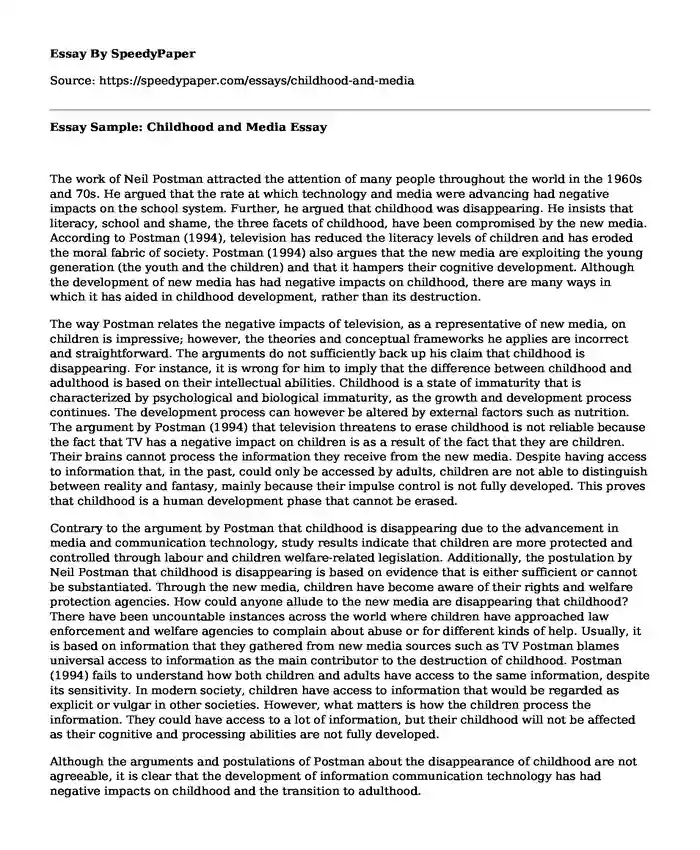
| Type of paper: | Essay |
| Categories: | Media Childhood Social issue Cognitive development |
| Pages: | 3 |
| Wordcount: | 591 words |
The work of Neil Postman attracted the attention of many people throughout the world in the 1960s and 70s. He argued that the rate at which technology and media were advancing had negative impacts on the school system. Further, he argued that childhood was disappearing. He insists that literacy, school and shame, the three facets of childhood, have been compromised by the new media. According to Postman (1994), television has reduced the literacy levels of children and has eroded the moral fabric of society. Postman (1994) also argues that the new media are exploiting the young generation (the youth and the children) and that it hampers their cognitive development. Although the development of new media has had negative impacts on childhood, there are many ways in which it has aided in childhood development, rather than its destruction.
The way Postman relates the negative impacts of television, as a representative of new media, on children is impressive; however, the theories and conceptual frameworks he applies are incorrect and straightforward. The arguments do not sufficiently back up his claim that childhood is disappearing. For instance, it is wrong for him to imply that the difference between childhood and adulthood is based on their intellectual abilities. Childhood is a state of immaturity that is characterized by psychological and biological immaturity, as the growth and development process continues. The development process can however be altered by external factors such as nutrition. The argument by Postman (1994) that television threatens to erase childhood is not reliable because the fact that TV has a negative impact on children is as a result of the fact that they are children. Their brains cannot process the information they receive from the new media. Despite having access to information that, in the past, could only be accessed by adults, children are not able to distinguish between reality and fantasy, mainly because their impulse control is not fully developed. This proves that childhood is a human development phase that cannot be erased.
Contrary to the argument by Postman that childhood is disappearing due to the advancement in media and communication technology, study results indicate that children are more protected and controlled through labour and children welfare-related legislation. Additionally, the postulation by Neil Postman that childhood is disappearing is based on evidence that is either sufficient or cannot be substantiated. Through the new media, children have become aware of their rights and welfare protection agencies. How could anyone allude to the new media are disappearing that childhood? There have been uncountable instances across the world where children have approached law enforcement and welfare agencies to complain about abuse or for different kinds of help. Usually, it is based on information that they gathered from new media sources such as TV Postman blames universal access to information as the main contributor to the destruction of childhood. Postman (1994) fails to understand how both children and adults have access to the same information, despite its sensitivity. In modern society, children have access to information that would be regarded as explicit or vulgar in other societies. However, what matters is how the children process the information. They could have access to a lot of information, but their childhood will not be affected as their cognitive and processing abilities are not fully developed.
Although the arguments and postulations of Postman about the disappearance of childhood are not agreeable, it is clear that the development of information communication technology has had negative impacts on childhood and the transition to adulthood.
Reference
Postman, N. (1994). The Disappearance of Childhood, New York: Vintage. 120-42.
Cite this page
Essay Sample: Childhood and Media. (2023, May 17). Retrieved from https://speedypaper.net/essays/childhood-and-media
Request Removal
If you are the original author of this essay and no longer wish to have it published on the SpeedyPaper website, please click below to request its removal:
- Essay Sample. Abuse of Power and Oppression of Women by Religious Theocracy in the Handmaid's Tale
- Essay Sample on Homelessness and housing unaffordability
- Paper Example. A Visual Analysis of Pip And The Southeastern Dogs
- Impact of Attitudes and Ideologies on Perpetuating Poverty. Paper Example
- Essay Sample on Main Issues That Are Facing California's Prison System
- Paper on Stories of Resilience: Unveiling Childhood Experiences in Sherman Alexie's Compelling Narrative
- Walter Mitch Rules of Editing Paper - Essay Sample
Popular categories




